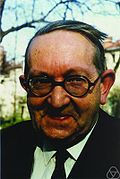Harold Davenport
| Harold Davenport | |
|---|---|

Harold Davenport in 1968
|
|
| Born |
30 October 1907 Huncoat, Accrington, Lancashire, England |
| Died | 9 June 1969 (aged 61) Cambridge, England |
| Residence | United Kingdom |
| Nationality | English |
| Fields | Mathematician |
| Institutions |
University of Wales University College London University of Cambridge |
| Alma mater |
University of Manchester Trinity College, Cambridge |
| Doctoral advisor | John Edensor Littlewood |
| Doctoral students |
John Horton Conway Alan Baker Peter Elliott H. L. Montgomery Martin Huxley |
| Known for |
Number theory Davenport–Schinzel sequence |
| Notable awards |
Rayleigh Prize (1930) Adams Prize (1940) Senior Berwick Prize (1954) Sylvester Medal (1967) Fellow of the Royal Society |
| Children | James H. Davenport |
Harold Davenport FRS (30 October 1907 – 9 June 1969) was an English mathematician, known for his extensive work in number theory.
Born in Huncoat, Accrington, Lancashire, he was educated at Accrington Grammar School, the University of Manchester, where he graduated in 1927, and Trinity College, Cambridge. He became a research student of John Edensor Littlewood, working on the question of the distribution of quadratic residues.
The attack on the distribution question leads quickly to problems that are now seen to be special cases of those on local zeta-functions, for the particular case of some special hyperelliptic curves such as .
Bounds for the zeroes of the local zeta-function immediately imply bounds for sums , where χ is the Legendre symbol modulo a prime number p, and the sum is taken over a complete set of residues mod p.
...
Wikipedia


